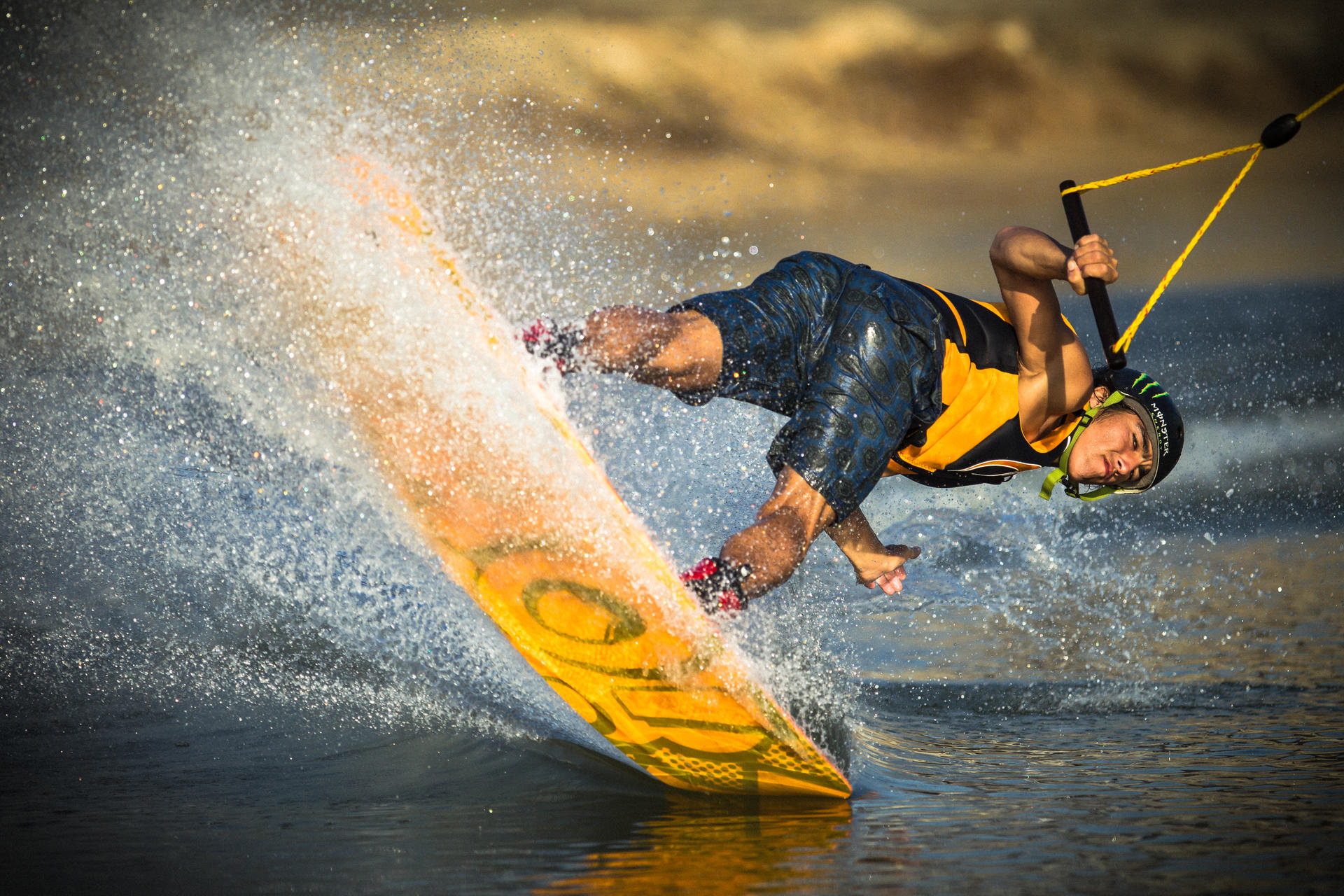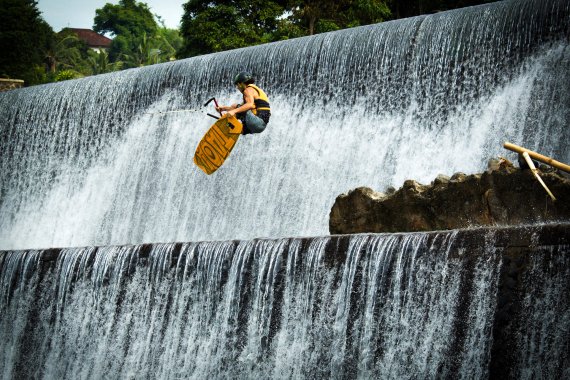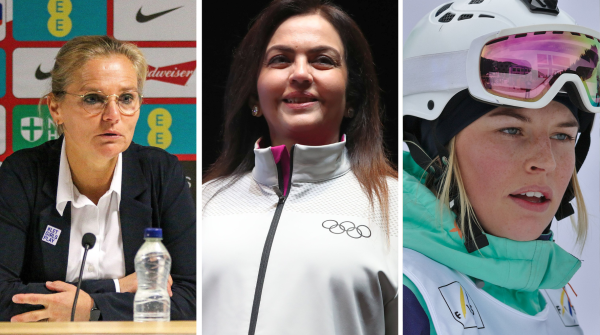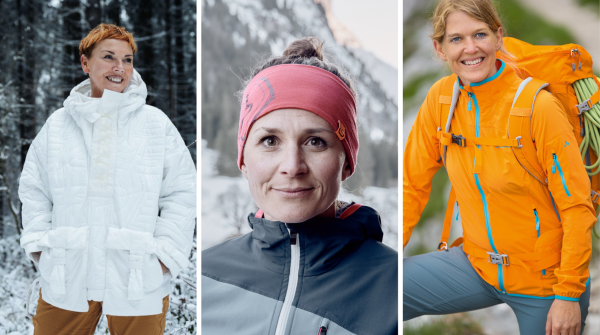
In an interview with ISPO.COM, the professional wakeboarder, who is only 18 years old, talks about the special challenges of big-air events like the Munich Mash, his daily training routine, and the future of wakeboarding as an action sport.
ISPO.COM: Mr. Grant, your website says TAO in big letters. What does that stand for?
Daniel Grant: That's my nickname. TAO means turtle in Thai. I got this nickname from my friends because I always wore a green life jacket and a green helmet when I started riding. I guess I looked like a turtle in that outfit. I kept the name because I think it's cool to come up with my own nickname.
What do you think of the Big Air event in Munich?
It's a brilliant show, and I like the idea that each rider is only allowed to show one trick. A competition like this is a great way to present our sport to a large audience, and I'm glad I was able to be part of it.
What is the biggest challenge in Munich Mash?
Since you only jump one kicker and can only do one trick, the biggest challenge is landing cleanly.
"Sport or career? Decision made at 13"
There are no big-air kickers at normal wakeboard facilities. How do you train for such events?
In everyday life, you can't train for big-air events. But I still try to make jumps when I train at the wakeboard facility, where I'm in the air as long as possible and take a lot of speed to fly far. It's only when we train on the kickers before the competition that you can really work on your tricks and try out what's possible.
So you don't have a plan at all about which tricks you want to show?
I decide that spontaneously after the first training session. But I'm not someone who likes to plan far ahead anyway. If I had to make a plan for everything in my life, I would go crazy. I like to surprise myself.
What does your training routine look like when you're at home?
I try to train at the wakeboard facility every day during the week because it's less busy then. What I do then depends on who else is there that day. I ride wakeboard and wakeskate. So if there are a lot of people wakeboarding, I grab my wakeboard as well. But if I get a day where I don't do much, I switch to my wakeskate and try new things with it.
Wakeboarding and wakeskating have the same importance for you?
Yes, I switch between the two boards all the time - I enjoy them both immensely.
Your professional career began when you were just 13 years old. How did you reconcile sports and school?
When I got the opportunity to wakeboard professionally, I had already accumulated a lot of absences from school. I then had to decide whether to continue wakeboarding alongside school or to focus fully on the sport. At the age of 13, I decided to pursue a career as an athlete, left home and moved into a house right next to the wakeboard facility.
Film projects in wakeboarding - as in other action sports - are a second focus of being a professional athlete, along with competitions. Is there a current project you are working on?
During the whole of last year, a filmmaker accompanied me. This year, unfortunately, I don't have as much budget because Monster Energy has pulled out of the sport. So I bought my own camera equipment and film with my friends at home at our facility and at other spots, for example in Bali or in Europe. I enjoy editing the films and learning something new in the process. When I finish editing the film at the end of the year, I'll see if I get help from a professional or if it works out the same way. My sponsors support the project and are fully behind me after last year's successful film.

"Wakeboarding still has a lot of potential".
Action sports are also interesting for big brands as an advertising platform. However, it happens time and again that companies withdraw again after a short engagement, like Monster Energy. What do you think about this as a professional athlete?
We athletes can only accept the situation as it is. Monster Energy's sponsorship has made a lot of things possible for me, of course. Now I am my own boss again. I have the feeling that big brands from the U.S. in particular are more quickly adopting this "hire and fire" mentality in sports. As athletes, we just have to live with that.
How do you see wakeboarding developing? Will the sport continue to grow and remain interesting as an advertising platform?
I think at the moment the sport is growing continuously. Events like the Red Bull Rising High are important because they present the sport professionally. Everything is just right here: from the organization to the support of the riders to the production of first-class photos and videos. Unfortunately, this is not always the case with WWA events. There is certainly still potential here to improve communication and thus make the sport even more popular.
Wakeboarding was on the "short list" of new sports for the 2020 Summer Olympics in Tokyo, but then received a cancellation from the IOC. What does this mean for the sport?
A presentation at the Olympics would certainly have been good for the popularity of the sport. But only if the competition format would have been on the level of the X-Games. The best athletes must compete in the best competition format, otherwise it is not advertising for the sport. Olympic boxing is a negative example for me - compared to professional boxing, it's a completely different world.
A look into the future of wakeboarding: Where will the sport develop?
I think there will continue to be all disciplines of wakeboarding and wakeskating. With System 2.0 technology, more and more events can be held where you can reach a large audience. This development will certainly continue - and our job as athletes is to present the sport in the best possible way.
Wakeboarding was on the shortlist of new sports for the 2020 Summer Olympic Games in Tokyo, but still got a refusal from the IOC. What does this mean for the sport?
A presentation at the Olympic Games would definitely have been good the sport’s popularity. But only if the competition format would have been at the level of the X Games. The best athletes have to compete in the best competition format, otherwise it’s not an advertisement for the sport. For me, Olympic boxing is a negative example – compared to professional boxing, it’s a completely different world.
A forecast of the future of wakeboarding: In which direction should the sport develop?
I think there’ll continue to be all disciplines of wakeboarding and wakeskating. With the technology of System 2.0 , more and more events can take place where you can reach a large audience. This development will definitely continue to advance – and our job as athletes is to present the sport as well as possible.



